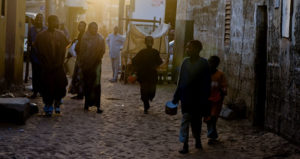7 July 2015
Historic ruling mounts pressure on Senegal to deal with forced child begging.
By Sarah Mathewson, Africa Programme Co-ordinator

Good news from Senegal!
In a historic ruling, the African Committee of Experts on the Rights and Welfare of the Child found that the Senegalese government is violating the rights of talibe children, forced to beg for their keep by their Quranic teachers in ‘daaras’ (Quranic schools). The pressure on Senegal to deal with the problems of talibés has increased massively.
This is the ruling in the case that was filed by our Senegalese partners RADDHO and the University of Pretoria Centre for Human Rights, back in 2012. We then worked on the case as part of our joint work on talibés. Although the case was won in May, only now has the ruling been issued. And the good news is that nearly all RADDHO’s recommendations were upheld by the Committee.
The fact that RADDHO’s complaint was heard by the ACRWC Court is significant in itself because RADDHO had no possibility to take such a case within the Senegalese judicial system – they weren’t the victims themselves, and would not have been able to take a case on behalf of such a large number of victims.
RADDHO’s complaint argued that the Senegalese government, in failing to protect talibés from this form of exploitation, was breaching rights guaranteed under the African Charter on the Rights and Welfare of the Child (ACRWC).
It presented evidence of the low rate of State prosecution and inadequate criminal sanctions of Quranic teachers who had forced talibés into begging, as well as little action to reform and regulate the daara system.
The ruling found Senegalese government guilty of breaching an impressive list of articles of the Charter:
- Article 4: best interests of the child,
- Article 5: the right to survival and development,
- Article 11: the right to education,
- Article 12: the right to leisure, recreation and cultural activities,
- Article 14: the right to health and health services,
- Article 15: protection against harmful and social practices,
- Article 29: prohibition of sale, trafficking and abduction of children.
The ruling has greatly increased pressure on the Senegalese government to end the exploitation of talibe children once and for all. Amongst other things, it means the African Union and others are now pledging money to support the implementation of those recommendations.
So pressure on Senegal to pass the regulatory law for daaras is on!
Anti-Slavery International is continuing to work with RADDHO to lobby for the legislation establishing daara regulation, to encourage national support for regulating daaras (including from Quranic teachers themselves), and to urge sanctions against those who fail to comply with the new standards set for daaras.